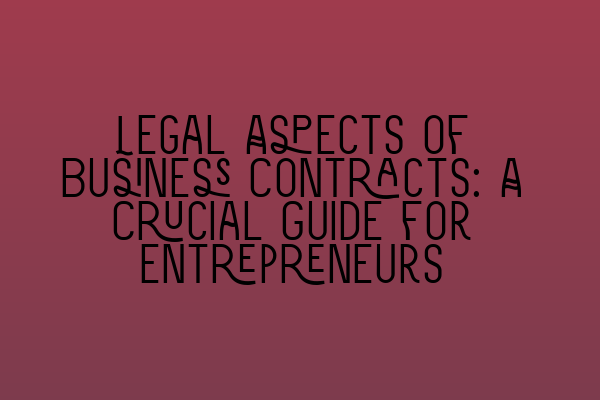Legal Aspects of Business Contracts: A Crucial Guide for Entrepreneurs
Welcome to the world of business contracts – the backbone of any successful business. Whether you are an established entrepreneur or just starting out, understanding the legal aspects of business contracts is crucial to protect your interests, maintain strong business relationships, and minimize potential disputes. In this comprehensive guide, we will dive into the key legal considerations that every entrepreneur should be familiar with when entering into business contracts.
1. Essential Elements of a Business Contract
A business contract is a legally enforceable agreement between two or more parties that sets forth the rights and obligations of each party. Understanding the essential elements of a business contract is fundamental.
The key elements include:
- Offer and acceptance: The parties involved must reach a mutual agreement on the terms and conditions of the contract.
- Consideration: There must be an exchange of something valuable between the parties, such as money, goods, or services.
- Intention to create legal relations: The parties must intend for the contract to be legally binding.
- Capacity: The parties must have the legal capacity to enter into a contract, such as being of legal age and mentally competent.
- Legal purpose: The contract must not involve illegal activities or go against public policy.
To learn more about the essential elements of a business contract, check out this SQE 1 Practice Exam Questions article.
2. Terms and Conditions
The terms and conditions of a contract outline the rights and obligations of the parties involved. These include the price, payment terms, delivery obligations, performance requirements, termination provisions, dispute resolution mechanisms, and more.
It is crucial to carefully draft and negotiate these terms to ensure they accurately reflect the intentions of the parties and anticipate potential future issues. Seeking legal advice and consulting experienced contract solicitors is highly recommended to ensure the terms and conditions are clear, fair, and enforceable.
For practical examples and tips on drafting effective terms and conditions, read this insightful SQE 1 Practice Mocks FLK1 FLK2 article.
3. Types of Business Contracts
Business contracts come in various shapes and sizes, tailored to different business needs and specific transactions:
- Partnership agreements: Establish the rights and responsibilities of partners in a business venture.
- Employment contracts: Govern the relationship between employers and employees.
- Supplier contracts: Detail the terms for the purchase of goods or services from suppliers.
- Customer contracts: Define the terms of sale or provision of products or services to customers.
- Non-disclosure agreements (NDAs): Protect confidential information and trade secrets.
- Non-compete agreements: Restrict individuals from competing with a business after leaving.
To delve deeper into the different types of business contracts and their significance, explore this informative SQE 2 Preparation Courses resource.
4. Contract Disputes and Resolutions
Even with the most carefully drafted contracts, disputes may still arise. Resolving contract disputes efficiently and effectively is vital for the smooth running of your business.
Consider the following approaches to contract dispute resolution:
- Negotiation: Parties engage in discussions to reach a mutual agreement.
- Mediation: A neutral third party facilitates discussions and assists in finding a resolution.
- Arbitration: An independent arbitrator is appointed to make a binding decision.
- Litigation: Disputes are presented and resolved through the court system.
To learn more about effective contract dispute resolution strategies, take a look at this comprehensive SQE 1 Preparation Courses article.
5. The Importance of Legal Assistance
Given the complexities and potential risks involved in business contracts, seeking legal assistance is highly advisable. A skilled contract solicitor can provide guidance, review contracts, offer negotiation support, and help protect your rights and interests.
If you need assistance or have specific legal questions regarding business contracts, reach out to a reputable contract solicitor or law firm with expertise in contract law. They can provide tailored advice based on the unique circumstances of your business.
Remember, having a well-drafted and legally sound contract is an investment in the future success of your business.
Conclusion
Understanding the legal aspects of business contracts is essential for entrepreneurs to navigate the business landscape successfully. By grasping the essential elements, drafting clear terms and conditions, familiarizing yourself with different types of contracts, and being aware of dispute resolution options, you can protect your business interests and foster healthy business relationships.
If you want to stay up-to-date with the latest developments and examination dates in the field of contract law, be sure to check out this informative article on SRA SQE Exam Dates.
